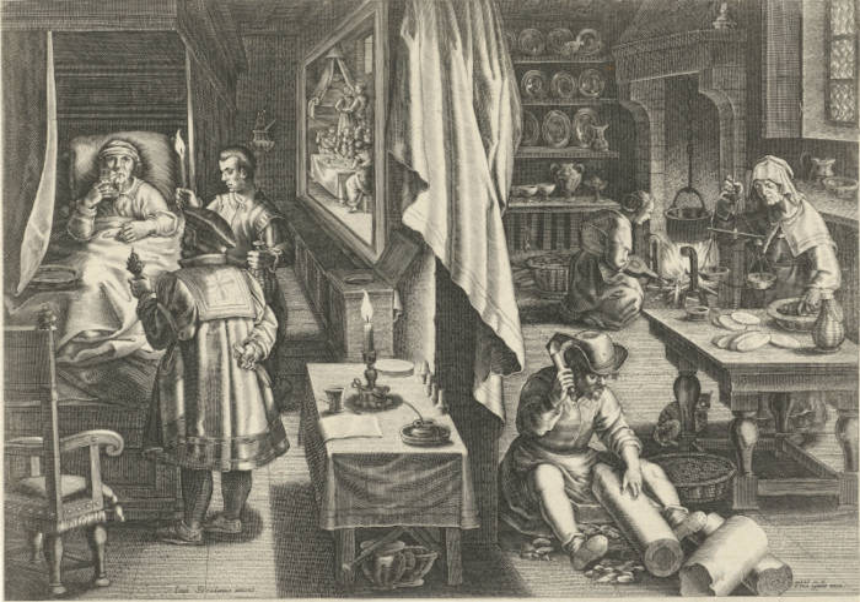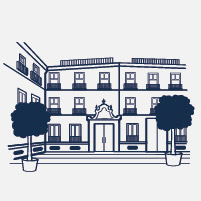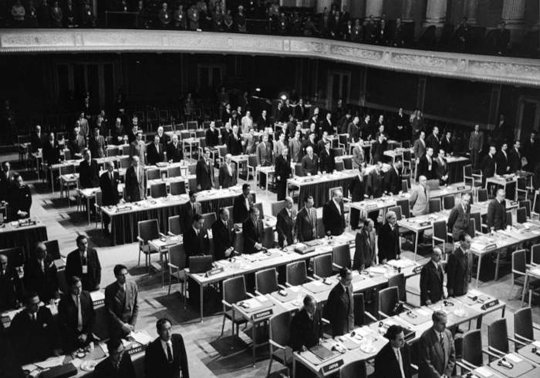.png)
20/06/23
NEW ENTRY IN "SABERES EN ACCIÓN" (KNOWLEDGE IN ACTION): "Vitalismo y naturaleza" (Vitalism and Nature) by Nicolás Fernández-Medina (Pennsylvania State University)
Second part of "saberes en acción" (knowledge in action): https://sabersenaccio.iec.cat/.
Category "Literature"
Gaspar Melchor de Jovellanos and vitalism in enlightened Spain: a poetic and reformist vision of nature.
The complex ideological changes in the sciences that transformed the consideration of the vital force of nature during the eighteenth century had a significant impact on the literary and intellectual spheres of Spain. Throughout this period, it became clear to what extent traditionalists and religious apologists of all kinds resisted the expansion of vitalist science. Pioneers of vitalist science such as Ignacio María Ruiz de Luzuriaga (1763-1822) were condemned for having developed innovative approaches to elucidating the dynamism of the body. These approaches not only redefined the vital order of nature and the place of the individual in it, but also subverted theological metaphysics of the body/soul and intellectual dogmatism in general.
To continue reading:
15/06/23
NEW ENTRY IN "KNOWLEDGE IN ACTION": "Diseases and treatments in the Spanish Golden Age theater" by Maríaluz López-Terrada (INGENIO (CSIC-Universitat Politècnica de València)
Second part of "saberes en acción" (knowledge in action): https://sabersenaccio.iec.cat/.
Category "Literature".
The reconfiguration of medical knowledge in seventeenth-century literary texts.
Dramatic texts of the 17th century provide historical research with a fascinating insight into the social image of medicine at a time when theatrical performances were something of an obsession. The most important theatrical genres of the period (the comedia, the entremés, and the auto sacramental) frequently depict practices associated with health and illness, from folk or magical beliefs to the academic medicine of physicians. The theatrical representation of academic medicine is a particularly well-studied topic. It is worth remembering, however, that medicine in the theater is a literary convention and different from the lived reality of a historical moment. Nevertheless, thanks to the frequent allusions and references to academic medicine, seventeenth-century theater remains of great interest for social history because playwrights and actors were the intermediaries between medical texts and the public in a society marked by a high level of illiteracy.
To continue reading:
https://sabersenaccio.iec.cat/malalties-i-tractaments-al-teatre-del-segle-dor-espanyol/

30/03/23
Closing of the Library at Easter
On the occasion of Easter the Biblioteca Historicomèdica (Historical Medical Library) will be closed from April 6 to 17, both days included
We apologize for any inconvenience

21/03/23
NEW ENTRY TO "SABERES EN ACCIÓN" (KNOWLEDGE IN ACTION): "Nación" (Nation) by Josep Simon (IILP-UV)
Second part of "saberes en acción" (knowledge in action): https://sabersenaccio.iec.cat/.
Category "Geographies"
The nation remains a unit of destiny in the local for scientific activity and the historian's mentality.
It may not be very flattering to our national pride to think that, while on the whole our literature is not surpassed by that of any other nation, there are certain areas, such as the physical and natural sciences, for example, in which it is extremely deficient, to the extent that publications made in France and Germany, either in translation or in their original version, enjoy immediate sale and wide acceptance among English students.
Anonymous review of Adolphe Ganot's manual Elementary Treatise on Physics. Published December 7, 1871 in The Leeds Mercury.
The ubiquitous organization of the nation state from the nineteenth century onward fostered tensions in international disciplinary communities around the sense of belonging, identity, and rivalry in the enterprise of scientific discovery and conquest. The concept of "nation" is older and derives from the Latin verb "nasci" (to be born) which it shares with the word "nature". It was applied in medieval European universities to the organization of their colleges by geographical origins and languages of the students. It was also used in the Republic of Letters, to denote distinctively national styles of thought, or in concepts such as the term "international" used by Jeremy Bentham (1748-1832) for jurisprudence that overflowed the state ruled by a single sovereign. In the historiography of science, the conception of science as the result of practices linked to nation-states and monolithic national cultures has acquired a primordial, if often unconfessed, place. It is a further effect of the processes that have shaped in parallel science, history and their intersections, and the idiosyncrasies of people who specialize in the history of science, a community often marked by the monolingual, monocultural, and national character of their training and experiences.
To continue reading:

13/03/23
Fallas timetable
On the occasion of the Fallas, the Biblioteca Historicomèdica (Historical Medical Library) will be closed from March 15 to 20, both days included.
Furthermore, the Library will be closed on the afternoon of March 14 from 2 p.m. onwards.
The Study Room will be open at its regular timetable on March 13 and 14.
We apologize for any inconvenience
10/02/23
Pepita Barba, an exceptional Catalan scientist
On the occasion of the International Day of Women and Girls in Science, which will be celebrated tomorrow, February 11, we bring to your attention a brief glimpse of the exceptional career of a little-known scientist who developed her personal and professional life between Spain and the United States, where she died almost a centenarian.
Josefa Barba-Gosé Flexner, also known as Pepita Barba, Josefa Barba, Josefa B. Flexner, or simply J.B. Flexner, born into a distinguished family, studied Pharmacy and Law. In 1926, at the age of 22, she decided to move to Madrid where she would settle in the prestigious Residencia de Señoritas. In 1927 he returned to Barcelona and started working at the prestigious Institute of Physiology of Barcelona, with August Pi Sunyer and Jesús Maria Bellido y Golferichs, and where he applied, through the Junta para la Ampliación de Estudios e Investigaciones Científicas (JAE), presided by Santiago Ramón y Cajal, for a scholarship to continue his training in the United Kingdom. He obtained it and stayed at the Royal Pharmaceutical Society of Great Britain between December 1928 and August 1929. After returning from England and presenting her doctoral thesis in Madrid, in 1929 she became a member of the Real Sociedad Española de Física y Química (SEFQ). In the early 1930s she applied for another scholarship to further her studies, this time at the philanthropic institution created by the patrons Rafael Patxot y Jubert: the Fundación Maria Patxot i Rabell. This financial aid allowed him to move to the United States, specifically to broaden his knowledge at the Johns Hopkins University School of Medicine in Baltimore. During her stay in Baltimore she met Louis Flexner with whom she would establish a friendship that years later would become a sentimental and professional relationship. After finishing her specialization studies in Baltimore, Josefa returned to Barcelona in 1932.
In July 1937, Josepa Barba Gosé, fleeing from the Civil War, clandestinely crossed the Pyrenees through the El Pertús border crossing, where she met the American neurophysiologist Louis B. Flexner (1907-1996). Flexner (1902-1996), whom she married. Together, they moved to the United States, where she began, under another name -married-, a fruitful personal and scientific life. There she began to work at Johns Hopkins University, together with her husband, and developed a fruitful scientific career. Most of her scientific achievements in the field of neurophysiology would not come until 1951, when they moved to Philadelphia to work at the University of Pennsylvania. Two years later, they founded the prestigious Institute of Neurological Sciences, which Louis would direct. After 59 years of life and research together, Louis died in April 1996 and Josepa died 4 years later, in 2000, at the age of 97. The story about their life went virtually unnoticed throughout the 20th century. It was not until the end of the first decade of the 21st century, when Pepita Barba's name was mentioned in the memoirs of Núria Pi-Sunyer, August Pi-Sunyer's niece, who directed Pepita Barba's work during her years at the Institute of Physiology in Barcelona.
In the Biblioteca Historicomèdica you will find the following work of Pepita Barba from 1929, co-authored by her: Acció de l'efedrina sobre la pressió arterial / per J. Puche i Álvarez, J. Barba i Gosé ; primera nota (HMED 1901-1939 / 0076 (04) and about the author you can find, online, the article Dues vides, un objectiu, by Àlvar Martínez-Vidal and Empar Pons Barrachina





























